Archive for the ‘Mathematical Poetry Specimen’ Category
Entry 143 — Taxonomical Update
Friday, June 11th, 2010
I toppled back into my null zone a couple of days ago. Don’t feel like writin’ nuttin’ but have something too important not to make public right now. It has to do with my recent taxonomy. I want to add that “propaganda” is now a rank under “Sociodominance,” and “information” a rank under “Utilitry.” I want also to put “war” and “politics” under “Sociodominance,” and add “play” to my Phylum.
“Play,” by the way, breaks down into “games” and “pretense.” “Games” I define as activities without connection to any other member sharing the category “games” is in whose participants follow rules and pursue some goal the attainment of which is considered victory. I can’t remember the details of Wittgenstein’s demonstration that “games” could not be defined, but believe I have definied it. Metaphoric use, or misuse of the term notwithstanding. “Pretense” is unserious participation in any of the activities in my Phylum, by “unserious,” meaning that no knowledgeable person would consider the activity to be in any significant way the “real thing”–children playing house, for instance.
I also have a new long division mathemaku to bring to the world’s attention. I won’t even draw it, it’s so lame: actual salt (glued to the page) divided into “NaCl” gives you “naming” with a subdividend product ot “salt” and a remainder of “science.” This is lame because it’s just the statement of an opinion, to wit: “By naming the real substance, salt, you get the word, “salt,” which is equal, when “science” is added to it, to was salt esentially is, which, it is implied, is more than what it is as a substance. The only reason I bother to post the poem at all is because it reverses the standard belief that real things are more than the words for them. For me, words are more than their referents.
Entry 116 — Finally Back
Tuesday, March 9th, 2010
All I have today is a revision of my last mathemaku:
The title of the piece is “Mathemaku in Honor of Andrea Bianco’s 1436 Map of the World.” I changed the previous quotient from “music” to a picture of a lute. My reasoning was that “music” was too general; I wanted something that said “medieval.” I’m satisfied with it now.
I’m a bit shocked to see how long it’s been since my last entry here. I thought it’d only been four or five days. I’m going to try to post more often now, maybe not daily but at least three or four times a week. The past three days I’ve woken up feeling good. I’ve been more productive though not as productive as I’d like to be. Still, I’m out of the null zone I was in.
Part of the reason for that is that my bad leg (due apparently to sciatica) is better, although I still can’t run on it to any extent. I’m optimistic that it will fully come around if I give it time and don’t play tennis again till I’m sure it’s okay. Three times I played when it seemed okay but not right, and each time suffered during the next few days.
The pain pills I’m taking for the problem are probably (alas) the main reason I’m feeling so good psychologically. Also contributing it the fact that I’m winning the game of Civilization I’m playing in! I’ve never won it at the level I’m now playing it at. This shouldn’t mean anything but it means a ridiculously lot! Winning just about any kind of competition really zings me!
That’s it for now. Hope to be back tomorrow. Will definitely be back before the week ends.
Entry 44 — A Mathemaku & Some Poetics Notes
Tuesday, December 15th, 2009
The following, which is from #691, is one of my earlier mathemaku. It’s simple to understand: just think ripples, and remember that in strict mathematical equations, what’s on one side of an equals sign is upposed to stay there, and what it might mean metaphorically if it did not.
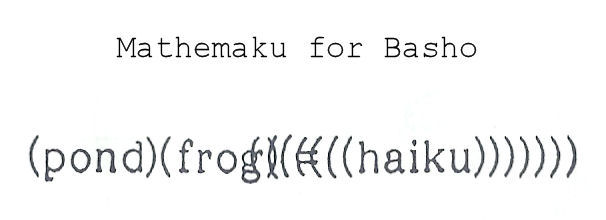
Next we have a page I scribbled some notes on in 2003 that makes good sense to me at this time, although I never took the notes into any kind of essay, that I recall:
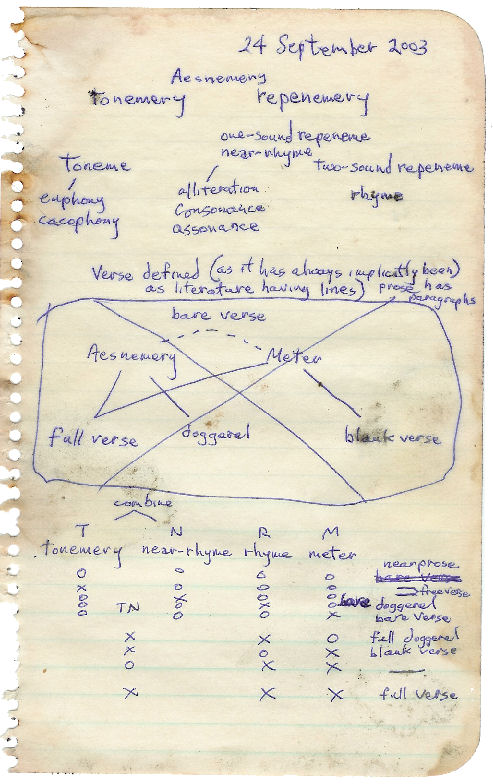
And now, after two simple uploads, I’m too worn-out to do anything else, believe it or not.
Entry 40 — #675 through #670
Saturday, December 12th, 2009
In #675, I posted Endwar’s “Ten X Ten,” having liked it so much, I assume, that I’d forgotten I’d posted it a week of so before at my blog. Under the Endwar piece, I had three mathematical poems by Kaz Maslanka, one of which is also a visual poem but too large to reproduce here without losing most of the text. One of the others has the same problem, but the one below should be readable:
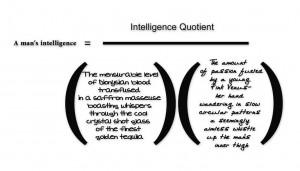 Oops, you may need a magnifying glass. My choice of reproduction seems to be the size above, or four times as large. Anyway, it’s called “A Man’s Intelligence” and may be more informrature–a specimen of informratry–than poetry. Let me quote what it says: “A man’s Intelligence” equals “intelligence Quotient” divided by the product of “The measurable level of Dionysian blood transfused in a saffron masseuse boasting whispers through the cool crystal shot glass of the finest golden tequila” times “The amount of passion fueled by a young pink Venus–her hand wandering in slow circular patterns, a seemingly aimless whistle up the man’s inner thigh.”
Oops, you may need a magnifying glass. My choice of reproduction seems to be the size above, or four times as large. Anyway, it’s called “A Man’s Intelligence” and may be more informrature–a specimen of informratry–than poetry. Let me quote what it says: “A man’s Intelligence” equals “intelligence Quotient” divided by the product of “The measurable level of Dionysian blood transfused in a saffron masseuse boasting whispers through the cool crystal shot glass of the finest golden tequila” times “The amount of passion fueled by a young pink Venus–her hand wandering in slow circular patterns, a seemingly aimless whistle up the man’s inner thigh.”
#677 and #678 are about the Christmas mathemaku I’d done a draft of the previous year, and worked some more on at this time (December 2005), and have worked on since then, finishing it, I believe. Then a reproduction and revision of a long division poem I used in the autobiographical essay in the mainstream series of such things I got it into many years ago, without its making any difference whatever in my vocational reputation. I don’t like it well enough to reproduce it here. I had another of my mathematical poems in #680 that I don’t like enough to reproduce here.
Entry 34 — Yesterday’s Mathemaku Again, and Another
Saturday, December 5th, 2009
Here’s the latest version of what I think I’m calling “Frame 17″ of The Long Division of Poetry:
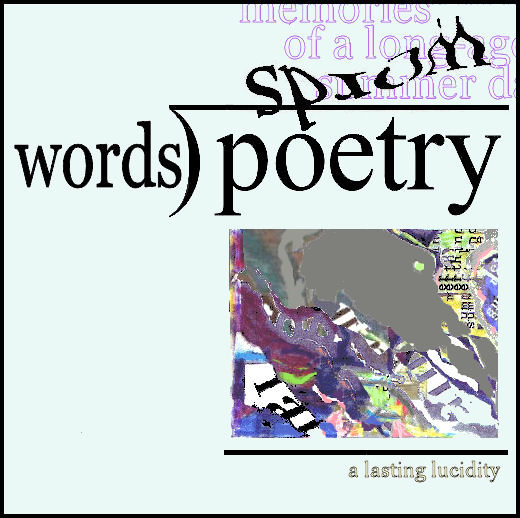
I didn’t like the background blue as dark as it showed here, so I lightened it. For some reason, that made a lot of difference to me. I also changed the quotient of the mathemaku below, another variation on the lead frame of The Long Division of Poetry that I composed in 2007 and have only touched up slightly since, mostly to increase its resolution. I feel it’s about as good as I’m capable of getting as a mathematical poet–although I do feel I’ve done a few mathemaku that are better than it.

The divisor is hard to read on-site, I don’t know why. The image is much darker than it is on the screen of the computer where I do my Paint Shop work, even though I tried to lighten it. Oh, it’s tiff on my computer, jpeg here, which may explain it. Anyway, the divisor reads, “a memory of/ Harbor View, June 27, 1952″
Note: for those of you new to Grumman Studies, “manywhere-at-once,” which is usually capitalized, is where (according to my poetics) metaphors and other figures of speech send one. Two or more places in one’s brain at the same time. So this poem attempts to express the value of equaphoration–my term for any poetic device that in some way equates one thing with another, even irony, which equates the truth with its opposite.
Entry 33 — Yesterday’s Poem
Friday, December 4th, 2009
Here’s yesterday’s image again:
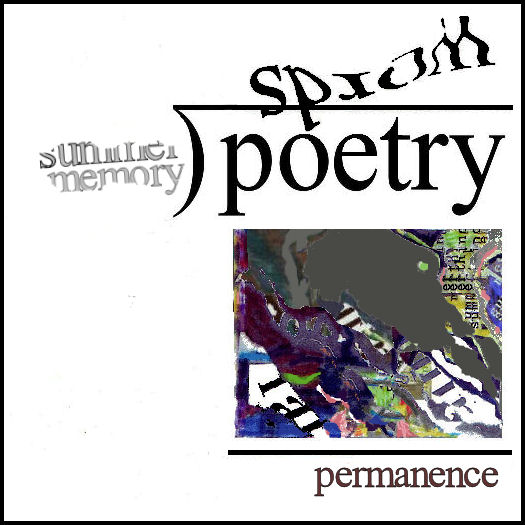
It’s one of my mathemaku, of course. I’ve actually been working industriously on it, trying get it right enough to submit to some sort of anthology Nico Vassilakis and Crag Hill are putting together. The version above is a recent revision of my first draft of 2007, a variation on “Frame One” of my Long Division of Poetry series.
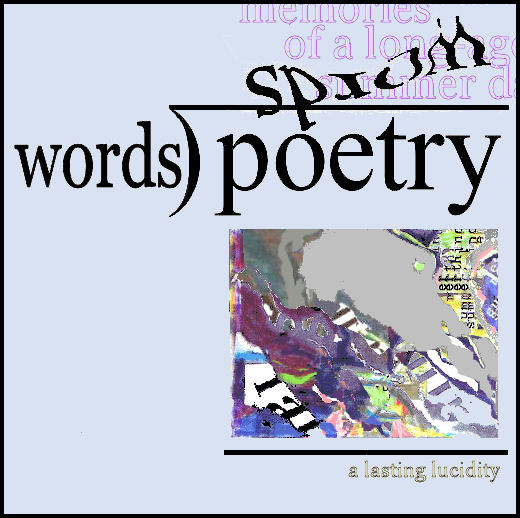
“Frame One” is similar to the top image except that its divisor is “words.” It had long bothered me because (and make sure to write this down, students, because it’s an excellent example of the way I think about my poems) its claim was that “words” squared (basically–although it’s really distorted words, or words told slant. times regular words) happened to equal an image having to do with summer rain. Why that and not, say, a Pacific sunset? Obviously, the quotient times the divisor could equal anything. That, I didn’t want. Off and on I thought about this, but could think of no way to take care of it. Until a couple of days ago, when I finally concentrated for more than a few minutes on it. I came up with several pretty good solutions, one of them changing everything in the poem but the sub-dividend product (the image).
My final solution (I hope) resulted in the above poem. All I did was add “memories of a long-ago summer day” to the quotient. That assured that the sub-dividend product would have to do with summer–that it would be, that is, a visual poem about summer. And, as a poem, it would be poetry.
No doubt in due course I’ll think of something else I find illogical about it and want to revise it again. For now, though, I’m happy with it.
Oh, I’ve made several changes to the main image in it, too. One was to combat the darkness in the top version (which wasn’t in it until I put it out here). I’m as fussy about getting my graphics looking the way I want them as I am about everything else in a poem–except the choice of font, and things I can’t do anything about with my equipment, like density of resolution.
Entry 32 — A Mathemaku from 2007
Thursday, December 3rd, 2009
I continue to be more out of it than not, so have just this for today:

Guess who composed it.
Entry 31 — Old Blog Entries 663 through 670
Wednesday, December 2nd, 2009
In #663, I presented my Odysseus Suite–but the reproduction is too crude for me to re-post it here. My nest entry featured this, by Endwar:
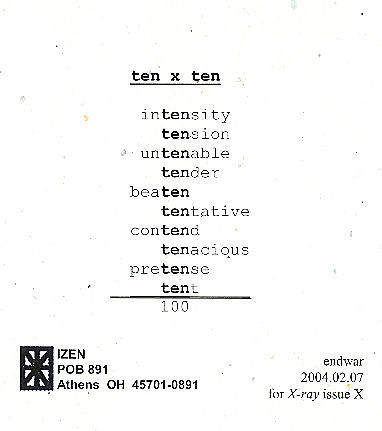 As I announced when I first posted this, I am hoping to publish an antho- logy of mathematical poems, like this one, so if you have one or know of one, send me a copy of it, or tell me about it.
As I announced when I first posted this, I am hoping to publish an antho- logy of mathematical poems, like this one, so if you have one or know of one, send me a copy of it, or tell me about it.
#665 had this by Marton Koppany, which I have to post here because it was dedicated to ME:

Hey, it’s mathematical, too. The next entry, whose number I fear to state, concerned this:

This is from Typewriter Poems, an anthology published by Something Else Press and Second Aeon back in 1972. It’s by Alison Bielski, An English woman born in 1925 whose work I’m unfamiliar with. I find this specimen a charmer . . . but am not sure what to make of it. Three lines, as in the classic haiku. The middle one is some sort of filter. Is “n” the “n” in so much mathematics? If so, what’s the poem saying? And where does the night and stars Hard for me not to assume come in? Pure mathematics below, a sort of practical mathematics above? That idea would work better for me if the n’s were in the lower group rather than in the other. Rather reluctantly, I have to conclude the poem is just a texteme design. I hope someone more clever sets me right, though. (I’m pretty sure I’ve seen later visio-textual works using the same filter idea–or whatever the the combination of +’s. =’s and n’s is, but can’t remember any details.)
It was back to my lifelong search for a word meaning “partaker of artwork” in #667–but I now believe “aesthimbiber,” which I thought of in a post earlier than #667, I believe, but dropped, may be the winner of my search.
Next entry topic was about what visual poets might do to capture a bigger audience. I said nothing worth reposting on a topic going nowhere because visual poets, in general are downright inimical to doing anything as base as trying to increase their audience. One suggestion I had was to post canonical poems along with visual poems inspired by them, which I mention because in my next entry, I did just that, posting a Wordsworth sonnet and a visual poem I did based on and quoting part of it–and don’t re-post here because of space limitations. I wrote about the two in the final entry in this set of ten old blog entries.
Entry 25 — Old Entries 641 through 651
Thursday, November 26th, 2009
azily back to old blogs again, this time beginning this mathematical poem by Andrew Topel taken from #641:

A very slightly revised version of one of the mathemaku in yesterday’s entry not worth posting here was the feature in my next entry. Then some minor autobiography. In #644 & #645 I posted 3 more of Andrew Topel’s addition poems, including:

On September 24, 1997, I started my first blog, an actual log for my poetry website, Comprepoetica. In entries #646 through #651 I reprinted my (few) entries. OF great historical interest, no doubt, but too boring to post here.




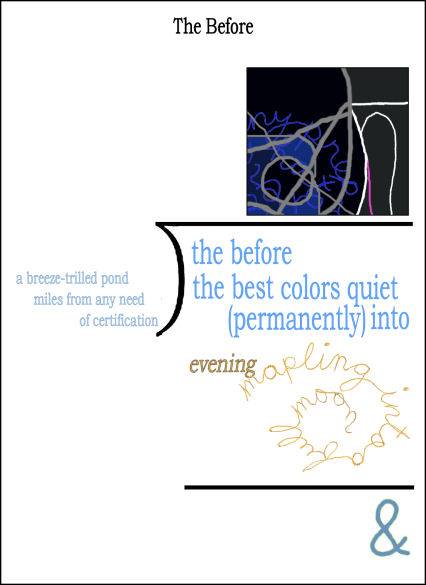


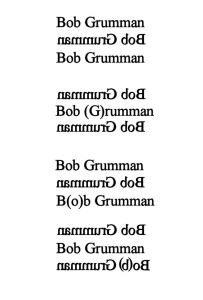






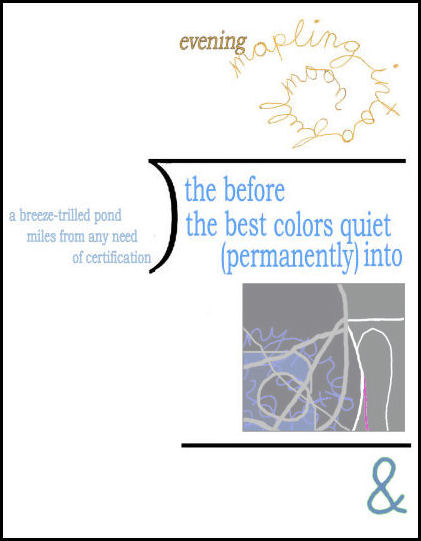


Whose sleep is the sky.
Aah, you minimalists!
But possibly yours is an equal but different version of the poem; I like Poem physically in his poems, though, and the emphasis on the time the question intrigues him. There’s even a juxtaphor (implicit metaphor) between the motion of the sky and the motion of Poem’s wonder–for me, at any rate.
It just came to my mind as a possible “answer” to Poem’s “question”. Perhaps, yes, because he was physically there.
I’m still working my way in reverse (top to bottom) on your blog, Bobby, so I may find more like these, but I think there’s something really interesting going on in “Mathemaku No. 21,” specifically in the figure after the minus sign. I like the possibilities with the reverse type creating new shapes inside those already created in the mashing up of letters.
Thanks for the look, Kevin.